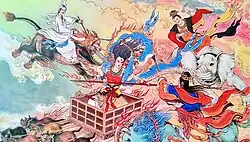Jinling Shengmu
.jpg)
Jinling Shengmu (simplified Chinese: 金灵圣母; traditional Chinese: 金靈聖母; pinyin: Jīnlíng Shèngmǔ; lit. 'Saint Mother (of) Golden Spirit') is a character in the 16th-century Chinese novel, Fengshen Yanyi, which is also known as The Investiture of the Gods.[1] She is a powerful immortal of the Jie sect, being one of the four chief disciples of its leader, Tongtian Jiaozhu.
Legend
In Fengshen Yanyi, Jinling Shengmu is one of the four chief disciples of Tongtian Jiaozhu. Her own disciples included the high-ranking Grand Tutor of the Shang Dynasty, Wen Zhong, and Yu Yuan. She was highly respected within the Jie sect for her deep cultivation and formidable power, which was said to surpass even that of the Twelve Golden Immortals of the rival Chan sect.[2][3][4][5]

During the Battle of the Ten Thousand Immortals, she defeated Princess Longji and Hong Jin. She faced off against the three great immortals: Wenshu Guangfa Tianzun, Puxian Zhenren, and Cihang Zhenren. Despite their combined efforts, Jinling Shengmu overpowered them, forcing them to retreat. However, her victory was short-lived. As she pursued the fleeing immortals, she was ambushed by Randeng Daoren, a senior member of the Chan sect. He struck her down from behind with his powerful magical weapon, the Dinghai Shenzhu (定海神珠; Sea-Calming Divine Pearl), killing her instantly.[6][7][8]
Following her death, Jiang Ziya, the orchestrator of the investiture of the gods, canonized Jinling Shengmu with a high celestial position. She was appointed as Kangong Doumu, the primordial Mother Goddess of the Big Dipper. In this exalted role, she resides in the Dou Mansion (斗府) and holds dominion over all stars and constellations. She is said to command 84,000 stars and celestial spirits, a role that places her at the head of all heavenly bodies and among the most revered deities in the Daoist pantheon described in the novel.[3] In the esoteric teachings of Taoism, she is identified as the same as Doumu.[9][10][11]
Character evaluation
Dong Jiangbo, a literary critic and editor of Beijing Daily, described Jinling Shengmu as the strongest female warrior in Investiture of the Gods. He noted that she is portrayed as having attained the realm of “All Things are Severed,” where her strikes not only destroyed physical forms but also cut through the karmic roots of cultivation, a power said to be beyond the comprehension of Great Luo immortals. He further observed that her “Star-Flow Coordination Method” was later adopted as a core tactic of the Heavenly Court, influencing formations such as Wen Zhong’s Twenty-Four Heavenly Lords of Thunder.[12]
Worship
Jinling Shengmu is one of the principal deities in the village of Molangfang in Haidong, Tian Dalishi. She is venerated as the goddess of fertility in this village, and her attire is adorned with myriad characters. Scholars consider these characters to be a clear symbol of fertility, signifying the community's prayers for abundant and prosperous life.[13]
References
- ^ 封神演义 (in Chinese). Beijing Book Co. Inc. September 2019. ISBN 978-7-5455-4857-0.
- ^ 神神鬼鬼:眾生萬象,神鬼亦然 (in Chinese). 北京時代華文書局. 1 January 2018. ISBN 978-7-5699-2348-3.
- ^ a b 一念即可成圣的金灵圣母,为两个弟子上了封神榜,后来她后悔了吗_手机网易网. NetEase News (in Chinese). 7 August 2020.
- ^ 居北极紫气之尊,金灵圣母为何能成斗姆元君?掌八万四千群星恶煞_手机网易网. 手机网易网 (in Chinese). 14 September 2020.
- ^ Chen, Fan-Pen Li (2007). Chinese Shadow Theatre: History, Popular Religion, and Women Warriors. McGill-Queen's Press - MQUP. ISBN 978-0-7735-3197-0.
- ^ 中国神话人物辞典 (in Chinese). 陝西人民出版社. 1998. ISBN 978-7-224-04279-5.
- ^ 明清文学史: 明代卷 (in Chinese). 武汉大学出版社. 1992. ISBN 978-7-307-00990-5.
- ^ "金灵圣母_金灵圣母资料_金灵圣母简介_金灵圣母生平_金灵圣母图片 - 中华网文史频道人物库". zh:中華網科技.
- ^ 金灵圣母和阐教十二金仙比,谁的道行更强?金灵圣母的原型是谁?_手机搜狐网. Sohu (in Chinese). 31 March 2021.
- ^ 金灵圣母是什么变的 金灵圣母和玉帝谁大_猎历史网. 猎历史网 (in Chinese). 7 March 2016.
- ^ 許姬传七十年见闻录 (in Chinese). 中华书局. 1985.
- ^ Jiangbo, Dong (10 August 2025). "《封神演义》最强女战神:陨落的金灵圣母与不灭的截教之魂". Beijing Daily.
- ^ 搖篮边的祝福: 中国诞生礼 (in Chinese). 上海文艺出版社. 2001. ISBN 978-7-5321-2310-0.